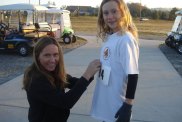Where was this mentioned in the What to Expect When You’re Expecting book? I sure don’t remember reading it!
The reality is that with pregnancy and childbirth, incontinence is a real problem for many women. The day after having my first child I remember being mortified that I wet myself when I coughed vigorously. Little did I realise there was more to come.
I was very fortunate to have my bladder control pretty much return to normal within a few months after giving birth, but two more pregnancies down the line things are not quite so rosy. No amount of begging from the boys will have this pregnant mummy jumping on the trampoline right now!
The more I talk to other mums, the more I realise it is more common for women to experience incontinence following pregnancy than it is for them not to. Especially if they’ve had multiple children or difficult births. It might be brought on by exercise, added weight from a new pregnancy or simply leaving a trip to the bathroom a little too late. Whether it’s an ‘every now and again’ occurrence or an everyday problem, most women experience it and it’s about time we opened up about it.
I asked some other mums about their experience with this “wee problem”:
Nothing like having morning sickness when pregnant with your second child and wetting your pants just about every morning while vomiting. – Ani
I thought I’d missed the whole incontinence thing until I took my daughter on a jumping castle when she was 10 months old. Lucky I had a spare change of clothes in the nappy bag and a baby to publicly blame for a nappy leak while sitting on my lap! – Tiffany
I always thought of incontinence as wetting myself due to a weak pelvic floor. That’s drilled into us. “Do your pelvic floor exercises!” What I wasn’t expecting, was my posterior pelvic floor muscles being ruined, and therefore resulting in me pooing my pants in the middle of Coles. On more than one occasion, with many near misses nearly 4 years on! – Jenni
I had to wear incontinence liners during my second pregnancy. He was a large bubba (born 10 pound) and he was very low the entire time, the pushing on my bladder and urethra meant I would wee and it would feel like it was all gone, then I’d stand up pull up my pants and more wee would come out as I’d changed positions. It was embarrassing the first few times but a totally normal part of pregnancy for many and once I got the right product it was manageable. I was pleasantly surprised when it went away immediately after birth. – Kelly
I still vividly remember my first game of netball following my son’s birth. I didn’t even last the first quarter before I had to change underwear and go to the bathroom to clean up the wee pouring down my leg. It was horrifying. Now I wear a pad whenever I do sport and I definitely find that pelvic floor exercises have helped. – Rochelle
When I was still having daily “accidents” following my third child I decided it was time to see my doctor. I was very embarrassed but she was wonderful and sent me to a pelvic floor physio who really helped. – Amy
As a kid I used to tease my mum about “peeing her pants”, boy has that come back to bite me after five kids!! – Lisa
It’s so interesting that for many of the women I talked to, their stories, which must have been so embarrassing and awkward at the time, have turned into a bit of a punchline in the re-telling. There is almost a fondness in their tone. A bit like a war story– the battle of the wee. Oh my goodness, have we all been there!
The reality is that incontinence is a very real issue for many women, so if you suffer from it, you are definitely not alone. It isn’t something to be ashamed of, it isn’t your “fault” and it isn’t something you have to suffer in silence about. I’m not sure why there is still a stigma attached to incontinence (especially when so many of us have issues with it at some point or another), but there is. I get that it’s not something we’d bring up over a cuppa at mother’s group, but I wish we could talk about it a bit more openly. The fact is, incontinence might be a common in pregnancy and after childbirth, but it isn’t ‘normal’ and we don’t have to put up with it – there’s lots of help out there.
The Continence Foundation of Australia offers a free guide to bladder and bowel control during pregnancy and after childbirth. Click here to view online, download a pdf copy or order a copy to be sent to you.
Ask for the help you need!
More ways to keep yourself healthy:
- 10 Things That Happen in Pregnancy That Even Your Best Friend Won’t Tell You
- Breastfeeding While Sick: Is it Safe for Your Baby?
- How Motherhood is Making My OCD Better
Image: Getty








